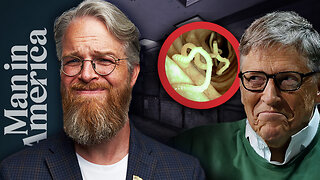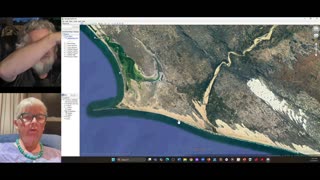Premium Only Content

The Shadow: Message from the Hills (May 22, 1938)
Setting: A contemporary (1938) American setting, likely a rugged, rural area with hills, possibly tied to a mining region, with scenes in a diamond mine, a mob boss’s hideout, and urban locations where Lamont Cranston and Margo Lane operate. The episode uses sound effects like pickaxes, gunfire, footsteps on gravel, and eerie whispers to create a tense, adventurous atmosphere, reflecting The Shadow’s blend of mystery and action.
Plot:
Introduction: The episode opens with the iconic The Shadow theme, an excerpt from Camille Saint-Saëns’ Le Rouet d’Omphale, followed by announcer Frank Readick’s chilling delivery of the signature line: “Who knows what evil lurks in the hearts of men? The Shadow knows!” The narrator introduces the story, hinting at a sinister plot unfolding in the hills, setting the stage for a tale of greed and crime.
The Premise: The story centers on a plot to rob a diamond mine, orchestrated by a mob boss named Jordan and his henchmen, Jake, Martin, and Limmy. Lamont Cranston, as The Shadow, becomes involved when he and Margo Lane encounter a clue—possibly a cryptic “message from the hills” delivered through Margo’s clairvoyance, as she “clears her mind” to sense danger. The message might warn of the impending heist or a murder tied to the mine, drawing The Shadow into the case.
The Investigation: Cranston, using his dual identity, investigates with Margo, interacting with characters like Mr. Fenton (a mine owner or official), Ned (a worker or informant), Major Whiteside (who dies in the plot), Tanga (a houseman), and a governor. The Shadow employs his invisibility and hypnotic abilities to infiltrate Jordan’s gang, eavesdropping on their plans or coercing confessions. Key scenes likely include Margo receiving a psychic warning, Cranston posing as a civilian to gather intel, and The Shadow thwarting henchmen in the mine’s dark tunnels, with sound effects like clanging metal or muffled explosions.
Escalating Action: As the plot unfolds, Jordan’s gang executes their heist, leading to violent confrontations. The Shadow’s interventions result in the deaths of Jordan, Jake, Martin, and Limmy, possibly through traps, shootouts, or their own greed-driven mistakes. Margo’s clairvoyance, a unique element in this episode, guides The Shadow to critical moments, such as saving a key character or locating the stolen diamonds. The rural hill setting adds a rugged backdrop, with scenes of pursuit across rocky terrain or inside the mine.
Climax and Resolution: The climax likely occurs in the diamond mine, where The Shadow confronts Jordan in a dramatic showdown, using his mental powers to outwit the mob boss. The heist is foiled, the diamonds are recovered, and the criminals meet their demise. The episode concludes with Cranston and Margo reflecting on the case, possibly with a nod to her clairvoyant insight, and the announcer teasing the next adventure, reinforcing The Shadow’s mystique with Readick’s haunting laugh.
Themes: The triumph of justice over greed, the power of unseen vigilance, and the interplay of intellect and mysticism. The episode reflects The Shadow’s pulp roots, blending detective work, supernatural abilities, and high-stakes action, with Margo’s clairvoyance adding a novel twist.
Cast and Roles:
The Shadow/Lamont Cranston: Played by Orson Welles, delivering a commanding, dual performance—suave as Cranston, menacing as The Shadow—with his rich, versatile voice enhancing the character’s mystique.
Margo Lane: Played by Margot Stevenson, portraying Cranston’s companion with intelligence and sensitivity, her clairvoyance adding a psychic dimension to her role, voiced with a mix of determination and unease.
Jordan (Mob Boss): Played by an unnamed actor, likely a radio veteran, voicing the ruthless gang leader with a gruff, authoritative tone, dying in the climax.
Jake, Martin, Limmy (Henchmen): Played by unnamed actors, depicting loyal but doomed criminals with gritty, subservient voices, each meeting a fatal end.
Other Characters:
Mr. Fenton: Possibly a mine owner, voiced as a worried or defiant figure.
Ned: A worker or ally, voiced with earnestness.
Major Whiteside: A victim, voiced briefly before his death.
Tanga: A houseman, possibly with an accented voice, adding local color.
Governor: A minor authority figure, voiced with gravitas.
Announcer/Narrator: Frank Readick, delivering the opening and closing lines, including the iconic “The Shadow knows!” with a chilling, echoed effect, framing the story’s suspense.
Note on Cast: The Shadow relied on a talented radio cast, with Welles and Stevenson as the leads, supported by versatile actors doubling in minor roles. Performances leaned into the pulp drama’s heightened style, per Welles’s theatrical influence.
Production Details:
Music: The theme, an excerpt from Saint-Saëns’ Le Rouet d’Omphale, opens and closes the episode, with incidental music accentuating action and suspense, composed by Mutual’s in-house musicians.
Writer: Likely Walter B. Gibson or Edward Hale Bierstadt, crafting a story rooted in The Shadow’s pulp origins, emphasizing crime, mystery, and supernatural flair.
Director: Likely overseen by the Mercury Theatre team, with Welles’s influence ensuring a cinematic, fast-paced production.
Sound Effects: Critical to the episode, including pickaxes, gunfire, footsteps on gravel, mine collapses, and eerie whispers (for Margo’s clairvoyance), creating a vivid, adventurous soundscape. The Shadow’s invisibility might be suggested by sudden silences or distorted voices.
Sponsor: Blue Coal, a heating company, sponsored the 1937–1938 season, with brief ads integrated into the broadcast, typical of Mutual’s Sunday evening slot.
World and National Events Around May 22, 1938:
To provide context for the broadcast, here are key world and national events occurring in May 1938, reflecting the pre-war climate that shaped listeners’ perspectives:
World Events:
Nazi Germany’s Expansion: Germany, under Hitler, annexed Austria in the Anschluss (March 12, 1938) and was pressuring Czechoslovakia’s Sudetenland, escalating European tensions. Radio news reported fears of war, with the Munich Agreement looming (September 1938), resonating with the episode’s theme of unseen threats.
Italian Fascism: Mussolini’s Italy, aligned with Germany via the Pact of Steel (signed May 22, 1939, but in negotiation), continued its imperialist policies post-Ethiopia (1936). U.S. media covered Axis aggression, paralleling The Shadow’s fight against criminal masterminds.
Japanese Invasion of China: Japan’s Second Sino-Japanese War intensified, with the Battle of Xuzhou (May 1938) leading to Japanese gains. U.S. radio reported humanitarian concerns, amplifying anti-Axis sentiment, echoed in the episode’s moral crusade.
Holocaust Escalation: Nazi anti-Jewish policies worsened, with Kristallnacht (November 1938) approaching. May 1938 saw increased persecution, with limited U.S. awareness via radio, aligning with The Shadow’s vigilance against evil.
National Events:
Economic Challenges: The U.S. was in the “Roosevelt Recession,” a 1937–1938 economic downturn, with unemployment at 19%. New Deal programs, like the Wagner Act, supported labor, covered in radio news, reflecting public interest in justice and stability, akin to the episode’s themes.
Roosevelt’s Policies: President Franklin D. Roosevelt pushed for economic recovery and neutrality in foreign affairs, with radio addresses emphasizing democratic values. The Fair Labor Standards Act (passed June 1938) set a minimum wage, boosting morale.
Entertainment and Morale: Hollywood and radio thrived, with films like Snow White and the Seven Dwarfs (1937) and radio shows like The Lone Ranger dominating. The Shadow’s pulp-inspired drama, airing Sundays, appealed to listeners seeking escapism amid economic and global woes.
Sports and Culture: The 1938 MLB season featured the New York Yankees, with Joe DiMaggio shining. Benny Goodman’s swing music, like “Sing, Sing, Sing,” defined the era’s vibrant culture, covered on radio.
Cultural Context: Aired in the anxious spring of 1938, “Message from the Hills” captivated American listeners by portraying The Shadow as an invisible avenger thwarting greed-driven crime, offering escapism amid fears of economic hardship and global war. The episode’s diamond mine heist and Margo’s clairvoyance tapped into 1930s fascination with pulp adventures and mysticism, seen in films like The Mummy (1932), while its crime-fighting narrative echoed Mr. District Attorney’s legal crusades. Welles’s performance, fresh from his Mercury Theatre fame, added theatrical flair, making the Sunday evening broadcast a thrilling diversion for a nation grappling with uncertainty.
-
![Mr & Mrs X - [DS] Trafficking Empire – The Pedo Network Island, The Cover-Up: Part 2 - Ep 6](https://1a-1791.com/video/fww1/f8/s8/1/y/p/x/f/ypxfz.0kob-small-Mr-and-Mrs-X-DS-Trafficking.jpg) 59:56
59:56
X22 Report
18 hours agoMr & Mrs X - [DS] Trafficking Empire – The Pedo Network Island, The Cover-Up: Part 2 - Ep 6
66.6K19 -
 1:03:07
1:03:07
Candace Show Podcast
1 day agoI’M BACK! And STILL Asking Questions (Sorry Brigitte). | Candace Ep 233
103K204 -
 13:13
13:13
Mrgunsngear
17 hours ago $4.71 earnedStreamlight TLR-1 HP Review: Can It Dethrone Surefire?
30.9K10 -
 1:26:34
1:26:34
Man in America
20 hours agoExposing the Cover-Up That Could Collapse Big Medicine: Parasites
79.7K73 -
 1:12:09
1:12:09
Wendy Bell Radio
6 hours agoPet Talk With The Pet Doc
13.6K36 -
 27:15
27:15
Liberty Hangout
2 days agoThe Most DELUSIONAL Democrats on Earth!
33.9K140 -
 38:41
38:41
JohnXSantos
1 day ago $0.74 earnedHow To Start A CLOTHING BRAND on a BUDGET! Step X Step (2025)
12.8K2 -
 30:57
30:57
Her Patriot Voice
17 hours ago $16.28 earnedDemocrats More Unhinged Than EVER Before!
99.6K133 -
 29:13
29:13
Clownfish TV
1 day agoGen Z are Becoming the Boomers?! | Clownfish TV
23.9K39 -
 1:48:31
1:48:31
Squaring The Circle, A Randall Carlson Podcast
20 hours agoMEGA Tsunamis and the formation of our World ft. Dr. Dallas Abbot
38.1K9